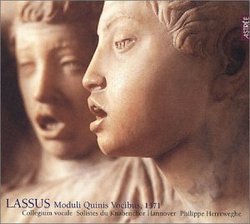| All Artists: Orlande de Lassus, Philippe Herreweghe, Collegium Vocale, Soloists from the Knabenchor Hannover Title: Lassus: Moduli Quinis Vocibus, 1571 Members Wishing: 2 Total Copies: 0 Label: Astree Original Release Date: 1/1/1979 Re-Release Date: 4/9/2002 Genre: Classical Styles: Opera & Classical Vocal, Chamber Music, Historical Periods, Classical (c.1770-1830) Number of Discs: 1 SwapaCD Credits: 1 UPC: 709861088720 |
Search - Orlande de Lassus, Philippe Herreweghe, Collegium Vocale :: Lassus: Moduli Quinis Vocibus, 1571
 | Orlande de Lassus, Philippe Herreweghe, Collegium Vocale Lassus: Moduli Quinis Vocibus, 1571 Genre: Classical
|
Larger Image |
CD Details |
CD ReviewsLatin sacred Motets Offer Opportunity to Study Renaissance M Leslie Richford | Selsingen, Lower Saxony | 04/04/2007 (4 out of 5 stars) "Roland (Orlando) di Lassus (Lasso): Moduli Quinis Vocibus, 1571. Ten Latin motets. Performed by Soloists from the Knabenchor Hannover (= Hanover Boys' Choir) and Collegium Vocale (Ghent), directed by Philippe Herreweghe. Recorded at the Petit Séminaire de Mariakerke, Belgium, in January 1979. First published as an LP, later as CD Astrée 7780. Total time: 46'16".
This must be one of Philippe Herreweghe's earliest recordings, harking back to the days before he joined Harmonia Mundi. Herreweghe's roots are as a Roman Catholic choir director in Ghent, Belgium, and he here leads a 20 voice choir, the basses, tenors and countertenors of which were taken from his Collegium Vocale. But as sopranos he does not here, as was to be the case in later recordings, use female voices; instead, he has five trebles from the Hanover Boys Choir (including, incidentally, Detlef Bratschke, who later went on to make a not inconsiderable name for himself in the German early music scene). At the end of the 1970's that was something of a sensation on the Continent, dovetailing in with the use of boy trebles on Nikolaus Harnoncourt's recordings of Bach Cantatas (in which Philippe Herreweghe was also involved). The sound is what we have come to expect from Renaissance motets: pure, vibratoless voices in perfect harmony, weaving contrapuntal patterns over austere but enjoyable melodies. What really distinguishes this recording is, however, the long essay printed in the booklet which not only explains in considerable detail how the motets are constructed but also, at the same time, takes a real look at the world-view of Renaissance man, explaining some of the ideas of the relationship between religion and numbers as well as music and numerology, and giving some enlightening ideas on how the mind of a Renaissance composer such as Lassus would have worked. To my mind, the essay is so valuable that it balances out the fact that the total playing time of the disc only actually fills out about half the space available. - Perhaps I should stress for newcomers that this is a purely vocal disc, there is no instrumental accompaniment of any kind, so that one is, as it were, locked in to the rhetorical structure of these works." |

 Track Listings (9) - Disc #1
Track Listings (9) - Disc #1